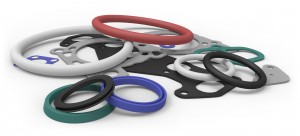 When it comes to selecting Buna vs. Viton for your sealing applications, the material needs will be determined by its intended application. Viton and Buna are two durable, elastomer materials commonly used in sealing applications for O-rings and gaskets. O-rings and gaskets are seals that are compressed in an area between two or more surfaces that are crucial to the functionality of machinery. They help join mechanical mechanisms together and prevent leakage of fluids.
When it comes to selecting Buna vs. Viton for your sealing applications, the material needs will be determined by its intended application. Viton and Buna are two durable, elastomer materials commonly used in sealing applications for O-rings and gaskets. O-rings and gaskets are seals that are compressed in an area between two or more surfaces that are crucial to the functionality of machinery. They help join mechanical mechanisms together and prevent leakage of fluids.
Selecting Buna vs. Viton as your material then is related more to the mechanical properties desired in the sealing application. Each provides optimal general-purpose sealing options that resist most oils and lubricants, particularly petroleum-based lubricants, and each functions efficiently in temperature applications between 5°F and 250°F. After that, the specific application needs become much more important.
Properties of Viton O-Rings
Viton is a synthetic rubber and fluoropolymer elastomer that is used in O-rings and other molded or extruded products. It offers the best fluid resistance of any commercial rubber. At high temperatures, Viton retains good mechanical properties compared to other elastomers. It remains substantially elastic and is resistant to oils and chemicals at elevated temperatures.
With its low permeability to a broad range of substances, Viton resists degradation from a wider variety of chemicals and fluids such as fuels, lubricants, and most mineral acids. Other mechanical properties include good resistance to compression, resistance to atmospheric oxidation, sun, climatic conditions, and even fungus and mold. Viton displays good electrical properties, too, in low-voltage, low-frequency applications.
Properties of Buna O-Rings
Buna is a widely used elastomeric material known for its tensile strength and high fuel and oil-resistant properties. It combines resistance with a low compression set and high abrasion resistance to make it the seal industry’s most widely used economical elastomer. Buna, also referred to as nitrile or Buna-N, is an NBR rubber that displays excellent resistance to all petroleum-based oils and fuels, as well as water, various alcohols, silicone greases, and hydraulic fluids. It offers such other advantages as good tear resistance and non-polar solvent resistance. It’s also less expensive than fluoroelastomers.
Buna’s physical and chemical properties vary depending on the polymer’s composition of Nitrile. High Nitrile content within the polymer provides higher resistance to oils but lowers its flexibility. In other words, Buna offers superior strength and is more resistant than natural rubber to oils and acids, however, its flexibility is limited. It also suffers from poor ozone, sunlight, and weather resistance, flame resistance, and is limited to moderately high temperatures.
Buna vs. Viton: Which Seal for Your Application?
As a sealing option, the crucial difference between Buna and Viton is the temperature range of the material’s function. Viton is the choice over Buna for high-temperature applications. Viton seals hold indefinitely at temperatures up to 400°F and can last up to 48 hours at temperatures up to 600°F. Buna is effective to 250°F. However, it can effectively seal mechanical objects at low temperatures to –22°F. Viton seals are rendered ineffective at temperatures below 5°F, with the material becoming hard and inflexible.
Environmental conditions also differentiate the application of Buna vs. Viton for sealing options. Viton offers universal chemical resistance for sealing applications for oils, fuels, and mineral acids. Its weatherability and resistance to mold and fungus, oxidation, ozone, and UV exposure offer additional excellent properties. Buna’s chemical resistance is much less than Viton’s, and its wearability and ozone exposure limit its application where such properties are required. That said, in circumstances that do not require such properties, Buna seals do offer superior abrasion and tear resistance and are more suitable for heavy-duty industrial applications.
Contact the Experts at Manufacturer’s Rubber
Knowing the performance requirements for your sealing applications is an important step in selecting the right material for the job. Whether your seal will be subjected to rugged environments, temperature extremes or harsh chemicals will all play a part in your selecting Buna vs. Viton. To meet your sealing application requirements, do not hesitate to consult with an expert at Manufacturer’s Rubber & Supply before making your final choice.

